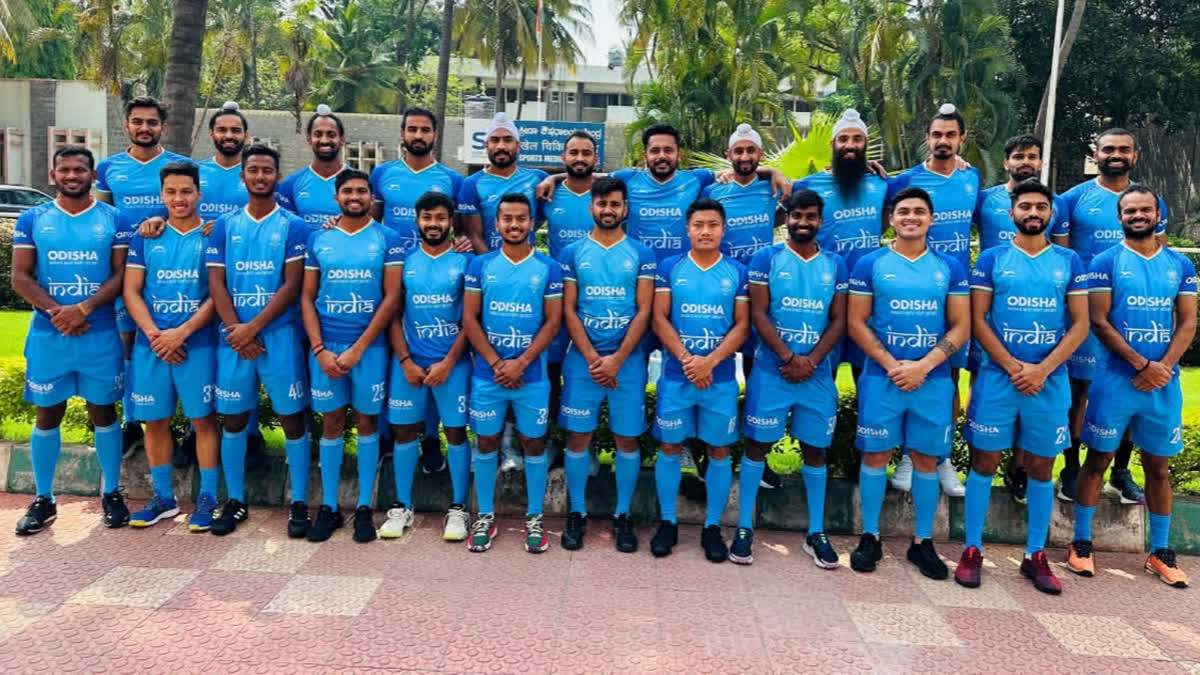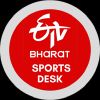Hyderabad: Hockey, the sport in which India has a rich legacy, is considered to be among the world's premier sports. The sport was introduced at the Olympic Games as a men's competition from the 1908 edition of the global event in London. However, the discipline was then removed from the 1924 Summer Games in Paris due to the lack of an international sporting structure. The omission of the sport led to the formation of the International Hockey Federation (FIH, Fédération Internationale de Hockey) in the capital city of France and Men's field hockey became a permanent feature at the next Olympic Games, the 1928 Games in Amsterdam.
The game of hockey was introduced to India by the British and was initially used as a way to build strength and stamina for the Indian army. The Indian Hockey Federation became a member of the FIH in 1927, and the Indian hockey team made their first appearance in the Olympics during the 1928 Summer Games. This marked the beginning of a legacy that includes eight gold medals, a record that stands to this day. On the other hand, the International Olympic Committee (IOC) voted to approve women's hockey as an Olympic event in July 1992. The discipline was then added to the carnival of sports.
India is the most successful team in this discipline in Olympic history, clinching 12 medals, including eight gold, one silver, and three bronze. The last medal came in the 2020 Tokyo Olympics, which was played in 2021 because of the COVID-19 pandemic when India defeated Germany 5-4 in the bronze medal match. The women's team lost in the bronze medal match against Great Britain by 3-4. However, they faltered to qualify for the upcoming summer games after an early exit in the Hockey Qualifiers held earlier this year. Let's delve deep into India's journey and recent performance in men's field hockey.
Recent Performance
The Indian men's hockey team qualified for the Paris Games with a top podium finish in the 2023 Hangzhou Asian Games. Harmanpreet Singh-led side then featured in FIH Pro League 2023-24 and performed well in the first two legs played in Odisha’s Bhubaneswar and Rourkela, securing the third spot in the points table with 15 points from eight games. In the next eight games, India managed to collect only nine points failing to maintain their winning spree and finished seventh after the conclusion of the FIH Pro League 2023-24.
Later, India's men's hockey team faced a clean sweep against Australia in a five-match test series and the series indicated India’s struggle against elite teams. India, fourth in the FIH rankings, are in Pool B in the men’s hockey tournament in Paris 2024 with reigning Olympic champions Belgium (world No. 2), Australia (world No. 5), Argentina (world No. 7), New Zealand (world No. 10) and Ireland (world No. 12). Team India will face a formidable challenge from Australia and Belgium in the Group stage because they have struggled against both sides in recent times.
Indian Hockey’s golden era
India's run from their Olympics debut in 1928 to the 1956 Summer Games was the golden era for Indian hockey, registering a double hat-trick. Notably, India clinched gold medals in 1928, 1932 and 1936 under British rule while they secured a second hat-trick of Olympic gold medals in 1948, 1952, and 1956 as an independent nation. Pakistan halted the gold run in the final at the 1960 Rome Olympics but India would ascend to the top spot at the podium yet again at Tokyo 1964 beating Pakistan. Men in Blue also won the gold medal in the 1980 Moscow Olympics.
Apart from the gold medals, India settled for Silver in the 1960 Rome Olympics and managed a bronze at Mexico in 1968, in what was then their lowest finish in the Olympics.
After 1980, India's men's hockey team failed to win a medal for the country at the Olympics until the Harmanpreet Singh-led side went against the odds and ended the medal drought in the discipline by securing a bronze medal in the 2020 Tokyo Olympics.
One reason considered by many behind the dominance of European teams like Belgium and Germany is the change of the surface from grass fields to astro turfs. The game witnessed a change in pace and the sport is played at a much quicker rate nowadays. The lack of pace required to excel on synthetic turfs hampered the Indian team as they focused more on skill rather than speed.
Basics of Sport
1. In hockey, two teams feature in one match and each side has 11 players, including 10 field players and one goalkeeper. There are five substitutes on the bench and there is no limit on substitutions. The objective of the sport is to score more goals than the opposite team before the stipulated time runs out.
2. The total duration of a field hockey match is 60 minutes (four quarters of 15 minutes each). The clock stops whenever the ball is called ‘dead’ by the umpires due to stoppages like injuries, lost ball or anything that is not in the flow of a game.
3. Players are only allowed to use the flat side of the stick to touch the ball. Failure to do so leads to a foul (backstick) and the ball is given to the opposition.
4. Goals can only be scored from inside the striking circle and any ball that goes in the goal from outside the circle (Dee) is not counted.
5. The circle also comes into play during penalty corners and is awarded when the opposition commits a foul in the striking circle but not always to thwart a possible goalscoring opportunity. If an offence takes place outside the striking circle but within the 23m area, the umpire can still award a penalty corner should the offence be severe.
6. The most common cause for a penalty corner is the ball touching a player’s feet in the circle. A foul is considered even if the ball touches a player’s feet during the gameplay.
7. A penalty stroke or penalty flick is awarded when an infringement inside the circle denies a certain goal from being scored.
8. A free hit is awarded to a team if the opposing team commits a foul outside the circle. It is taken close to where the offence occurred.
9. The field umpire calls it a dangerous ball when the ball bounces to a dangerous height after deflecting from the hockey stick.
INDIAN MEN’S HOCKEY TEAM FOR PARIS 2024 OLYMPICS
Goalkeepers: PR Sreejesh
Defenders: Jarmanpreet Singh, Amit Rohidas, Harmanpreet Singh, Sumit, Sanjay
Midfielders: Rajkumar Pal, Shamsher Singh, Manpreet Singh, Hardik Singh, Vivek Sagar Prasad
Forwards: Abhishek, Sukhjeet Singh, Lalit Kumar Upadhyay, Mandeep Singh, Gurjant Singh
Alternate players: Nilakanta Sharma, Jugraj Singh, Krishan Bahadur Pathak
Past Olympic Glory: Medal-Winning Indian Hockey Teams
1928 Amsterdam Olympics
Date: 17th May-26th May 1928
Position: Gold Medal
Captain: Jaipal Singh Munda
Squad: Jaipal Singh (C), Richard Allen, Dhyan Chand, Maurice Gateley, William Goodsir-Cullen, Leslie Hammond, Feroz Khan, George Marthins, Rex Norris, Broome Penniger (VC), Michael Rocque, Frederic Seaman, Ali Shaukat, Sayed Yusuf, Kher Singh Gill and Nawab of Pataudi.
1932 Los Angeles Olympics
Date: 4th August-11th August 1932
Position: Gold Medal
Captain: Syed Lal Shah Bokhari
Squad: Lal Shah Bokhari (C), Richard Allen, Muhammad Aslam, Frank Brewin, Richard Carr, Dhyan Chand, Leslie Hammond, Arthur Hind, Sayed Jaffar, Masud Minhas, Broome Penniger, Gurmit Singh Kullar, Roop Singh, William Sullivan and Carlyle Tapsell.
1936 Berlin Olympics
Date: 4th August-15th August 1936
Position: Gold Medal
Captain: Dhyan Chand
Squad: Dhyan Chand (C), Richard Allen, Ali Dara, Lionel Emmett, Peter Fernandes, Joseph Galibardy, Earnest Goodsir-Cullen, Mohammed Hussain, Sayed Jaffar (VC), Ahmed Sher Khan, Ahsan Khan, Mirza Masood, Cyril Michie, Baboo Nimal, Joseph Phillips, Shabban Shahab-ud-Din, G.S. Garewal, Roop Singh and Carlyle Tapsell.
1948 London Olympics
Date: 31st July-13th August 1948
Position: Gold Medal
Captain: Kishan Lal
Squad: Kishan Lal (C), Leslie Claudius, Keshav Dutt, Walter D’Souza, Lawrie Fernandes, Ranganathan Francis, Gerry Glacken, Akhtar Hussain, Patrick Jansen, Amir Kumar, Leo Pinto, Jaswant Singh Rajput, Latif-ur-Rehman, Reginald Rodrigues, Balbir Singh Sr., Randhir Singh Gentle, Grahanandan Singh, K. D. Singh Babu (VC), Trilochan Singh and Maxie Vaz.
1952 Helsinki Olympics
Date: 15th July-24th July 1952
Position: Gold Medal
Captain: KD Singh Babu
Squad: K. D. Singh Babu (C), Leslie Claudius, Meldric Daluz, Keshav Dutt, Chinadorai Deshmutu, Ranganathan Francis, Raghbir Lal, Govind Perumal, Muniswamy Rajgopal, Balbir Singh Sr., Randhir Singh Gentle, Udham Singh, Swarup Singh, Jaswant Singh, C.S. Dubey, C.S. Gurung, Dharam Singh and Grahanandan Singh.
1956 Melbourne Olympics
Date: 23rd November-6thDecember 1956
Position: Gold Medal
Captain: Balbir Singh Sr.
Squad: Balbir Singh Sr.(C), Leslie Claudius, Ranganathan Francis, Haripal Kaushik, Amir Kumar, Raghbir Lal, Shankar Lakshman, Govind Perumal, Amit Singh Bakshi, Raghbir Singh Bhola, Hardyal Singh Garchey, Randhir Singh Gentle, Balkishan Singh Grewal, Gurdev Singh Kullar, Udham Singh Kullar, Bakshish Singh, O.P. Malhotra and Charles Stephen.
1960 Rome Olympics
Date: 26th August-11thSeptember 1960
Position: Silver Medal
Captain: Leslie Claudius
Squad: Leslie Claudius (C), Joseph Antic, Jaman Lal Sharma, Mohinder Lal, Shankar Laxman, Victor John Peter, Govind Sawant, Raghbir Singh Bhola, Udham Singh Kullar, Charanjit Singh, Jaswant Singh, Joginder Singh, Prithipal Singh, Balkishan Singh Grewal, Cinnadorai Deshmuthu, Kulwant Arora, Bandu Patil, Erman K Bastian, Shanta Ram, Hari Pal Kaushik and J. Mascarenhas
1964 Tokyo Olympics
Date: 11thOctober-23rd October 1964
Position: Gold Medal
Captain: Charanjit Singh
Squad: Charanjit Singh (C), Shankar Laxman, R A Christy, Prithipal Singh, Dharam Singh, Gurbux Singh, Mohinder Lal, Jagjit Singh, Rajinder Singh, Joginder Singh, Hari Pal Kaushik, Harbinder Singh, Balbir Singh, Bandu Patil, Victor John Peter, Udham Singh Kullar, Darshan Singh and Syed Mushtaq Ali
1968 Mexico Olympics
Date: 13th October-26th October 1968
Position: Bronze Medal
Captain: Prithipal Singh
Squad: Prithipal Singh (C), R A Christy, Krishnamurty Perumal, Victor John Peter, Inam-Ur Rahman Munir Sait, Ajitpal Pal Singh, Balbir Singh (Services), Balbir Singh (Railways), Balbir Singh (Punjab) Gurbux Singh, Harbinder Singh, Harmik Singh, Inder Singh, Tarsem Singh, Dharam Singh and Jagjit Singh
1972 Munich Olympics
Date: 27thAugust-10thSeptember 1968
Position: Bronze Medal
Captain: Harmilk Singh
Squad: Harmik Singh (C), B. P. Govinda, Charles Cornelius, Manuel Frederick, Michael Kindo, Ashok Kumar, M. P. Ganesh, Krishnamurty Perumal, Ajitpal Singh, Harbinder Singh, Harcharan Singh, Kulwant Singh, Mukhbain Singh, Virinder Singh, Aslam Sher Khan, Vece Paes, V J Philips and Ajit Singh
1980 Moscow Olympics
Date: 20thJuly-29thJuly 1968
Position: Gold Medal
Captain: Vasudevan Baskaran
Squad: Vasudevan Baskaran (C), Bir Bhadur Chettri, Allan Schofield, Sylvanus Dung Dung, Rajinder Singh, Davinder Singh, Gurmail Singh, Ravinder Pal Singh, MM Somaya, Maharaj Krishan Kaushik, Charanjit Kumar, Merwyn Fernandes, Amarjit Singh Rana, Mohd. Shahid, Surinder Singh Sodhi and Zafar Iqbal
2020 Tokyo Olympics
Date: 23rd July-8th August 2021
Position: 3rd
Captain: Manpreet Singh
Squad: PR Sreejesh, Harmanpreet Singh, Rupinder Pal Singh, Varun Kumar, Amit Rohidas, Birendra Lakra, Surender Kumar, Hardik Singh, Manpreet Singh (Captain), Vivek Sagar Prasad, Nilakanta Sharma, Sumit, Shamsher Singh, Dilpreet Singh, Gurjant Singh, Lalit Kumar Upadhyay, Simranjeet Singh, Mandeep Singh



